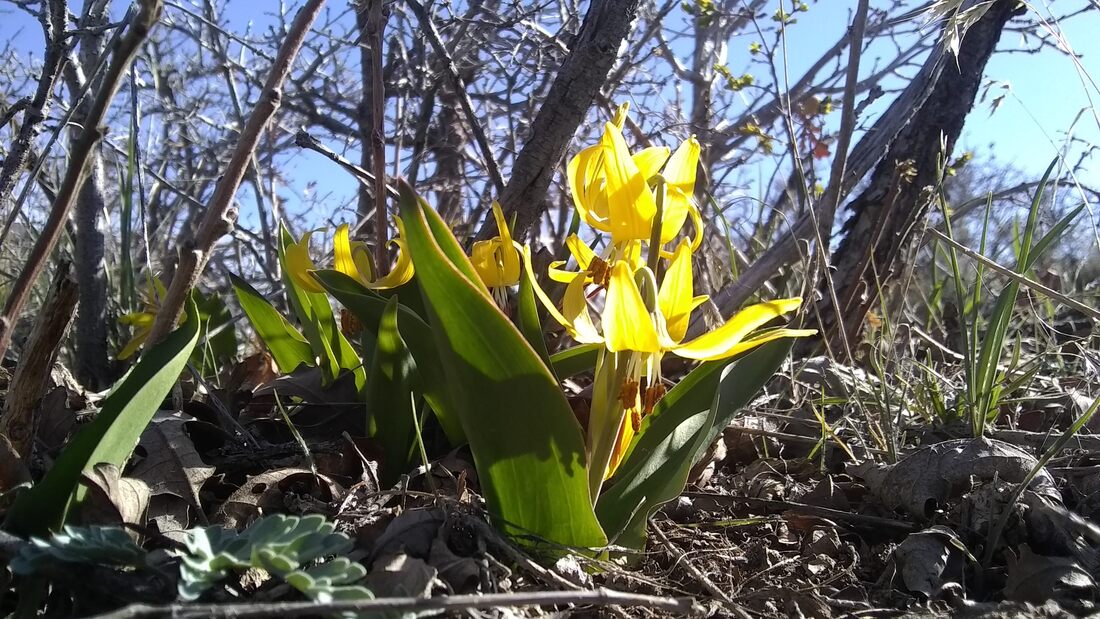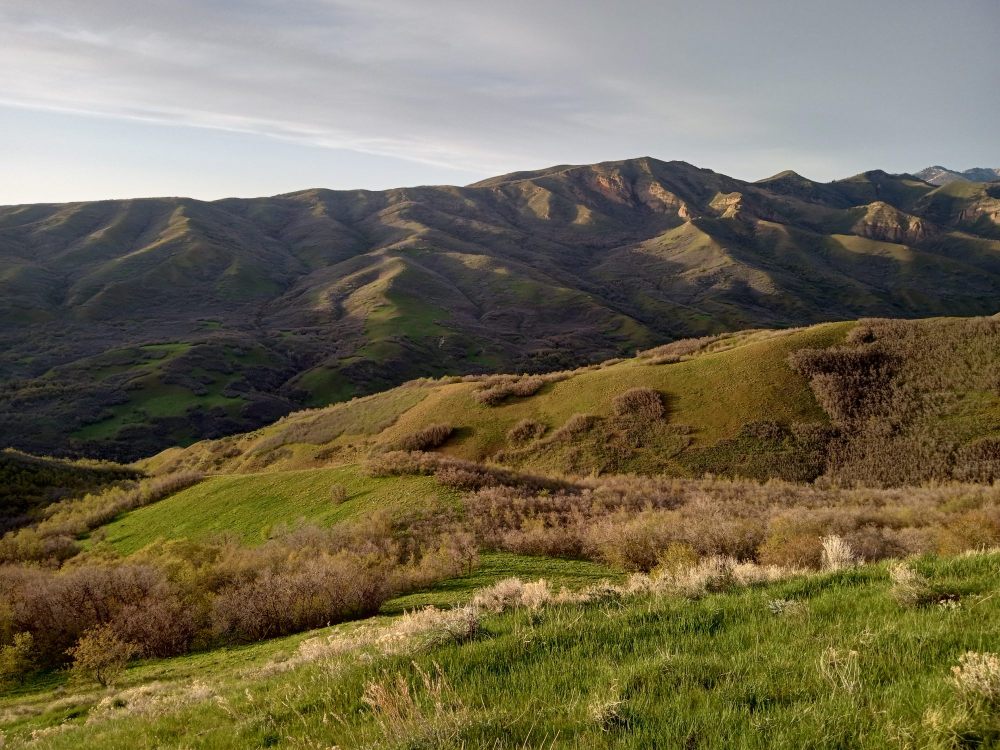Renewal
It is Easter week, and here in the Wasatch Range the foothills are still buried under several feet of snow. In most years, the first wildflowers would be blooming by now. Feeling a touch of cabin fever, I think back to a time three years ago when we were similarly housebound, although it was due to fear, not snowdrifts. Here's a piece I wrote back then in celebration of the coming of spring.
April 10, 2020--Good Friday in the Christian calendar. A pandemic grips the globe, but my spouse has gone to church anyway, not wishing to miss this important day. I choose to stay home and take my usual walk in the foothills. The blooms of early spring, mostly fritillaries and glacier lilies, dot the moist north-facing slopes, forming showy carpets of nodding yellow petals above rich, lily-like leaves. Around them are the emerging shoots of meadow grasses. Even the ubiquitous cheatgrass, which will turn brown in a matter of weeks, is now a lively green.
All around me life is bursting forth from the newly warmed earth. I think of Goethe’s lines from the first part of his play Faust, in which his protagonist observes the scene outside the city gate at Easter:
Released from the ice are river and creek,
Warmed by the spring’s fair quickening eye;
The valley is green with hope and joy;
The hoary winter has grown so weak
He has withdrawn to the rugged mountains.
From there he sends, but only in flight,
Impotent showers of icy hail
That streak across the greening vale;
But the sun will not suffer the white;
Everywhere stirs what develops and grows . . .
(from Faust, Part I, trans. Walter Kaufmann)
How can one’s thoughts not be elevated in such surroundings, even in a time of world crisis? How can one not think of renewal, or meditate upon the idea of resurrection?
I turn to the original German in this passage, and note that the words Kaufmann translates as “develops" and "grows” are Bildung and Streben, two terms which I’m sure Goethe did not choose lightly. Bildung, in its simplest form, means “education,” but the term can carry much deeper connotations. Wikipedia calls it “the process of harmonization of mind, heart, selfhood and identity.” It denotes how an individual, after undergoing a period of travail and experimentation during youth, learns to take on a constructive role within society. The process is exemplified by the Bildungsroman, the German literary form which Goethe himself employed in his early novel The Sorrows of Young Werther.
April 10, 2020--Good Friday in the Christian calendar. A pandemic grips the globe, but my spouse has gone to church anyway, not wishing to miss this important day. I choose to stay home and take my usual walk in the foothills. The blooms of early spring, mostly fritillaries and glacier lilies, dot the moist north-facing slopes, forming showy carpets of nodding yellow petals above rich, lily-like leaves. Around them are the emerging shoots of meadow grasses. Even the ubiquitous cheatgrass, which will turn brown in a matter of weeks, is now a lively green.
All around me life is bursting forth from the newly warmed earth. I think of Goethe’s lines from the first part of his play Faust, in which his protagonist observes the scene outside the city gate at Easter:
Released from the ice are river and creek,
Warmed by the spring’s fair quickening eye;
The valley is green with hope and joy;
The hoary winter has grown so weak
He has withdrawn to the rugged mountains.
From there he sends, but only in flight,
Impotent showers of icy hail
That streak across the greening vale;
But the sun will not suffer the white;
Everywhere stirs what develops and grows . . .
(from Faust, Part I, trans. Walter Kaufmann)
How can one’s thoughts not be elevated in such surroundings, even in a time of world crisis? How can one not think of renewal, or meditate upon the idea of resurrection?
I turn to the original German in this passage, and note that the words Kaufmann translates as “develops" and "grows” are Bildung and Streben, two terms which I’m sure Goethe did not choose lightly. Bildung, in its simplest form, means “education,” but the term can carry much deeper connotations. Wikipedia calls it “the process of harmonization of mind, heart, selfhood and identity.” It denotes how an individual, after undergoing a period of travail and experimentation during youth, learns to take on a constructive role within society. The process is exemplified by the Bildungsroman, the German literary form which Goethe himself employed in his early novel The Sorrows of Young Werther.
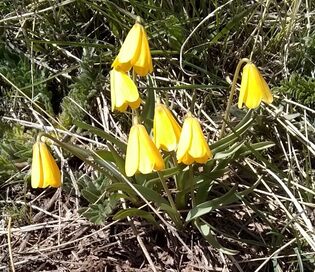
Streben, or “striving,” is another of those meaning-laden words Germans use so often, and can denote a person questing for power, moving with determination toward some goal, or (as in this usage) a plant reaching for the light. Clearly Goethe is not using these words to mean only that flowers and grasses are pushing up from the earth; they are stand-ins for the greater human quest toward knowledge and power, which is what obsesses Faust and leads him into mortal difficulty.
Goethe is framing the human struggle as if it arose out of the Earth itself. We see this made explicit at the beginning of the play, where Faust pulls an old tome from his shelf—evidently a book of magic spells--and opens it to the symbol of the macrocosmos. Contemplating this, he feels its “mysterious potency” which makes “nature’s hidden powers around me, manifest.”
Goethe is framing the human struggle as if it arose out of the Earth itself. We see this made explicit at the beginning of the play, where Faust pulls an old tome from his shelf—evidently a book of magic spells--and opens it to the symbol of the macrocosmos. Contemplating this, he feels its “mysterious potency” which makes “nature’s hidden powers around me, manifest.”
Faust then turns the pages to the symbol of the Earth spirit, which fills him with a strange sense of power:
As if I’d drunk new wine I’m glowing,
I feel a sudden courage, and should dare
To plunge into the world . . .
But when he pronounces the name of the spirit, a red flame appears and a voice quickly puts the old doctor in his place, informing him that he is “Peer of the spirit you comprehend/Not mine!” With this the earth spirit vanishes, leaving poor Faust to search anew for the powers and the understanding he seeks. He finds it, of course, through Mephistopheles, the Devil itself, and before long a bargain is struck which will take Faust on a wild ride through space and time, ending (in Goethe's recasting of the old legend), his salvation at the hands of a God that cannot condemn a human who strives with all his or her heart toward the Good.
Goethe set these opening scenes at Eastertide, a time of enormous significance for Christians as well as for pagan mystics, as represented in the ancient book of wisdom with which Faust summons the Earth spirit. Leaving his study, he observes the citizens of the city streaming out into the open air, singing, dancing, and flirting with each other, while a column of soldiers marches off toward a far-off war with the Ottoman Turks. He tells his assistant, Wagner, who accompanies him, of his ineffectual attempts to treat victims of the plague many years earlier, for which the peasants nonetheless still thank him. Could Dr. Faust’s times be more like ours than we imagine?
* * *
I leave the flower meadow and walk along the streets of a nearby subdivision, scanning the hillsides for wildlife and listening for birds. I try to relish this moment. Few cars are on the road, and it is noticeably quieter than usual. Even the dull roar of the city, five miles distant, seems to have lessened. “Quiet” is a poor term, of course, for an atmosphere filled with small sounds—leaves rustling in the wind, a robin’s call, a hawk’s cry, the movement of air through the oaks and pines.
Later today, with the warm weather, the figurative gates of our city will open and hundreds of its citizens will head up into our canyon: bicyclists, runners, people going for a drive in their car or a ride on their Harley. The sounds they make range from the slap of runners’ shoes on pavement, to the conversation of cyclists riding alongside each other, to the hiss of car tires. Above it all rises the loud rumble of the motorcyclists, whose powerful machines can be heard from a mile away. Their sound will increase throughout the day until by late afternoon it becomes a more or less continual roar. By then all peacefulness will have vanished from our canyon, and I will shelter in my home office with the radio on.
As if I’d drunk new wine I’m glowing,
I feel a sudden courage, and should dare
To plunge into the world . . .
But when he pronounces the name of the spirit, a red flame appears and a voice quickly puts the old doctor in his place, informing him that he is “Peer of the spirit you comprehend/Not mine!” With this the earth spirit vanishes, leaving poor Faust to search anew for the powers and the understanding he seeks. He finds it, of course, through Mephistopheles, the Devil itself, and before long a bargain is struck which will take Faust on a wild ride through space and time, ending (in Goethe's recasting of the old legend), his salvation at the hands of a God that cannot condemn a human who strives with all his or her heart toward the Good.
Goethe set these opening scenes at Eastertide, a time of enormous significance for Christians as well as for pagan mystics, as represented in the ancient book of wisdom with which Faust summons the Earth spirit. Leaving his study, he observes the citizens of the city streaming out into the open air, singing, dancing, and flirting with each other, while a column of soldiers marches off toward a far-off war with the Ottoman Turks. He tells his assistant, Wagner, who accompanies him, of his ineffectual attempts to treat victims of the plague many years earlier, for which the peasants nonetheless still thank him. Could Dr. Faust’s times be more like ours than we imagine?
* * *
I leave the flower meadow and walk along the streets of a nearby subdivision, scanning the hillsides for wildlife and listening for birds. I try to relish this moment. Few cars are on the road, and it is noticeably quieter than usual. Even the dull roar of the city, five miles distant, seems to have lessened. “Quiet” is a poor term, of course, for an atmosphere filled with small sounds—leaves rustling in the wind, a robin’s call, a hawk’s cry, the movement of air through the oaks and pines.
Later today, with the warm weather, the figurative gates of our city will open and hundreds of its citizens will head up into our canyon: bicyclists, runners, people going for a drive in their car or a ride on their Harley. The sounds they make range from the slap of runners’ shoes on pavement, to the conversation of cyclists riding alongside each other, to the hiss of car tires. Above it all rises the loud rumble of the motorcyclists, whose powerful machines can be heard from a mile away. Their sound will increase throughout the day until by late afternoon it becomes a more or less continual roar. By then all peacefulness will have vanished from our canyon, and I will shelter in my home office with the radio on.
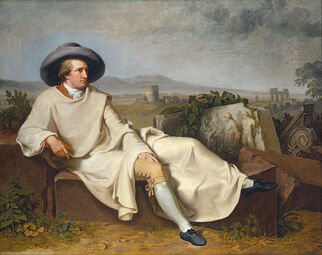 Johann Wolfgang von Goethe, by J. H. W. Tischbein. Wikimedia Commons
Johann Wolfgang von Goethe, by J. H. W. Tischbein. Wikimedia Commons
I think about those two words from the German: Bildung--to become educated in a larger, socially useful sense; to realize one’s place in the world; to find one’s own contribution. Streben—the striving that is so much a part of our western civilization and is both our highest aspiration and our ultimate downfall. Faust, the epitome of the learned Medieval man, looks back on a life of pursuing knowledge and finds that the encompassing, universal comprehension he has sought still eludes him, so he turns to darker forces for help. This is a very old theme—a mortal human seeks godlike powers and cuts his ties with the Earth to obtain them. Tragedy inevitably follows.
My mind is not really on spiritual matters this morning; I’m just trying to take in the sights and sounds of this little piece of the planet on which I walk. My personal Bildung story has involved many days spent outdoors, where some earthly force has had its way with me, cleansing ill thoughts, filling me with joys I cannot name, and awakening a better nature in me. Just to step outside on a morning such as this is to realize that the world out there is utterly real--the bedrock of our existence, as the writer Edward Abbey observed. I feel no need to summon spirits from the dusty pages of books, nor do I seek them in sacred groves; the sight and sound of green and growing things (the eternal striving toward the light) is enough.
There’s a sense of freedom to be found in strolling quietly among these foothills, where one can observe, smell, feel, touch, and hear as much of life as our senses allow. To set aside striving for a while and simply listen. To me this is a form of reciprocity, akin to what Robin Wall Kimmerer describes as Indigenous people’s relationship with the land, which calls for giving something in return for the blessings we so bountifully receive. I don’t carry a pouch of corn pollen to sprinkle on the glacier lilies, nor do I believe they need a physical offering, so my gift, poor as it may be, is to look and listen.
At heart, I do not even think that the plants and animals blossoming all around me want my gratitude. Mostly they need to be left alone. They will do fine without my strewing benedictions on them this morning. What seems to be called for is to absorb the lessons they offer. To understand that beauty is, or should be, paramount in our lives, that it is something we must cultivate and celebrate in all its forms. To not destroy that which grows freely, without our aid or direction. To realize that the Earth is a living provider to all forms of existence, not a storehouse to raid as we see fit.
There’s a sense of freedom to be found in strolling quietly among these foothills, where one can observe, smell, feel, touch, and hear as much of life as our senses allow. To set aside striving for a while and simply listen. To me this is a form of reciprocity, akin to what Robin Wall Kimmerer describes as Indigenous people’s relationship with the land, which calls for giving something in return for the blessings we so bountifully receive. I don’t carry a pouch of corn pollen to sprinkle on the glacier lilies, nor do I believe they need a physical offering, so my gift, poor as it may be, is to look and listen.
At heart, I do not even think that the plants and animals blossoming all around me want my gratitude. Mostly they need to be left alone. They will do fine without my strewing benedictions on them this morning. What seems to be called for is to absorb the lessons they offer. To understand that beauty is, or should be, paramount in our lives, that it is something we must cultivate and celebrate in all its forms. To not destroy that which grows freely, without our aid or direction. To realize that the Earth is a living provider to all forms of existence, not a storehouse to raid as we see fit.
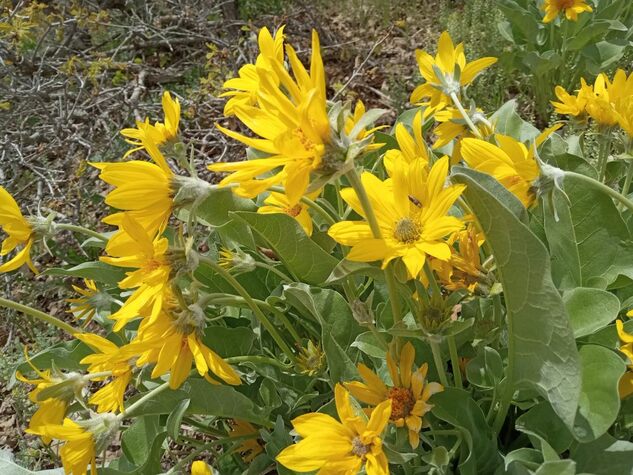
The knowledge of the pandemic’s terrible effects tempers my mood, but does not completely erase my uplifted thoughts on this lovely day. Many of our neighbors seem to feel the same way, and more of them have been out walking the streets in the evening. During the first few months of the pandemic, we would gather outside our homes to chat and even play instruments. There was less noise, and the air in town seemed clearer.
All this was purchased at great cost to those afflicted by the coronavirus. But setting aside the terrible effects of this disease, we can consider how our isolation prompted many of us to reach out to others. What if we were to make some of our adjustments to the pandemic a permanent part of our lives? What if we decided that growth, power, speed, and control would not be our prime motivators, but rather community, friendship, and watching out for each other? What if our conveniences and easy entertainments—the screens that keep us inside and apart from one another, the powerful vehicles we drive—were not prized quite as much? Would we not enjoy greater health, and would there not be more of the natural world around us to enjoy?
All this was purchased at great cost to those afflicted by the coronavirus. But setting aside the terrible effects of this disease, we can consider how our isolation prompted many of us to reach out to others. What if we were to make some of our adjustments to the pandemic a permanent part of our lives? What if we decided that growth, power, speed, and control would not be our prime motivators, but rather community, friendship, and watching out for each other? What if our conveniences and easy entertainments—the screens that keep us inside and apart from one another, the powerful vehicles we drive—were not prized quite as much? Would we not enjoy greater health, and would there not be more of the natural world around us to enjoy?
What it might take to achieve this, I do not know. I can only hope that the path to a quieter and less crowded future does not involve disease, collapse, and social disintegration. It should not be required of us to disappear as a species in order to make room for nature. There is a choice of direction facing us, and we don’t have very long to make up our minds.
We are not Faust, though we too often assume his mantle. It may be that we must set aside for a little while our great vanities--our endless striving for knowledge, power, speed, and control--and embrace the education offered us in wild and natural places.
Let us turn humbly to the spirit that animates this Earth. The gates of our confinement have opened, the long winter is relenting, and we stream out of our prison in search of life and hope.
We are not Faust, though we too often assume his mantle. It may be that we must set aside for a little while our great vanities--our endless striving for knowledge, power, speed, and control--and embrace the education offered us in wild and natural places.
Let us turn humbly to the spirit that animates this Earth. The gates of our confinement have opened, the long winter is relenting, and we stream out of our prison in search of life and hope.
